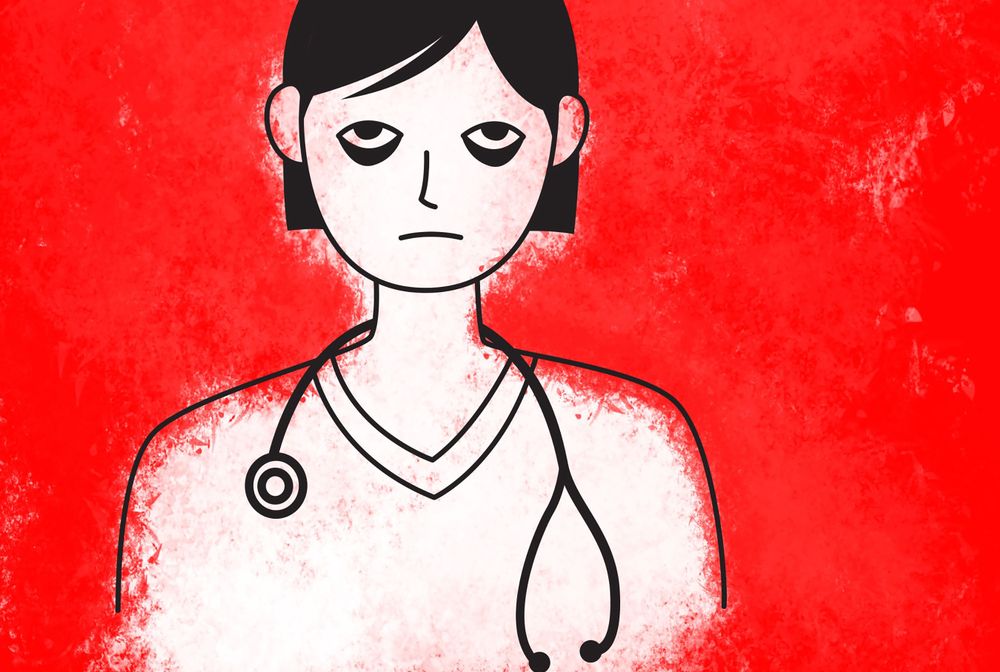India is going through a hard time right now. Most of us start our day with a warm cup of tea and sad, cold news. Everyday we read about the ugly side of COVID-19, whether it’s the shortage of oxygen, hospital woes or increasing mortalities. Our hearts ache for overworked front-line staff, COVID-19 patients, their families and essentially the dire state of our nation. However, sometimes, our hearts don’t ache. Or sometimes they ache so much that you feel the pain 24/7 and are in a constant state of stress. Both sides of this spectrum of emotions can be termed as compassion fatigue, and it is more common that we think.
This article by Health Line describes it as,
Compassion fatigue is the emotional and physical burden created by caring for those in distress. It’s total emotional depletion. Those experiencing compassion fatigue tend to lose touch with their empathy. They feel overwhelmed and less connected to their work and their loved ones.
Compassion fatigue is primarily seen in doctors, nurses, therapists and caregivers, who face human suffering daily. However, due to the pandemic and the constant coverage of tragedy, instant news on patients’ sufferings and social media spreading real, painful stories, all of us are suddenly surrounded by human pain. And this can get overwhelming. While it is in no way comparable to what front-line workers face, it does have an effect on us and our mentality.
Why People Face Compassion Fatigue
People (usually medical workers) face compassion fatigue because they tend to take on the trauma and suffering of the people they are looking after. In this article by American Psychological Association, Kerry Schwanz, PhD at Coastal Carolina University said that compassion fatigue doesn’t just make it difficult to feel empathy for human pain, but can also result in burnout (too much work and not enough resources to do that work well) and secondary traumatic stress which trigger “empathy overload” leading to anxiety, intrusive thoughts, hyper-vigilance, numbness or feelings of having nothing left to give. Dr. Amit Sood in his book, The Mayo Clinic Guide To Stress-Free Living aptly explains compassion fatigue being experienced by those who aren’t health workers. He says,
We are inundated with graphic images of the unimaginable suffering of millions. We can fathom the suffering of a few, but a million becomes a statistic that numbs us.
Symptoms Of Compassion Fatigue
This article by Good Therapy states these as some common symptoms of compassion fatigue:
- Chronic physical and emotional exhaustion
- Depersonalisation and detachment
- Anxiety, stress and/or depression
- Irritability
- Feelings of self-contempt
- Difficulty sleeping
- Weight loss or weight gain
- Headaches
- Poor job satisfaction
- Lack of productivity
- Substance addiction
Overcoming Compassion Fatigue
With the surge in COVID-19, compassion fatigue is on the rise, especially for the front-line workers and it isn’t easy to overcome. However, here are few things that one can do to deal with it based on information provided by Psychology Today, American Psychological Association and Health Line. The first step is to acknowledging compassion fatigue and recognising the signs. Dr. Beth Hundall Stamm, an expert on the topic recommends using her Professional Quality of Life questionnaire to assess the condition and become aware of it. She says,
Through awareness and healthy self-care, those who experience compassion fatigue can start to understand the complexity of the emotions they’ve been juggling and, most likely, suppressing.
1. Consistent self-care
Whether it’s a quick mediation session, 5-minute morning journaling or even going for a run every other day, stick to a consistent self-care routine to make you calmer, happier and take your mind off your stressors. Be kind to yourself and accept that it is okay to take time off and indulge in self-care.
2. Ask for help
Ask a professional to help you out when you need. Ask someone to run your errands for you when you feel low. Ask your mother to call you and check-in. Ask for help, even if you feel the slightest urge to! Express your needs verbally, and it will make a difference
3. Stay away from bad news
When given a choice, avoid reading COVID-19 ridden newspapers, opening Whatsapp groups that circulate the same sad stories infinite times, scrolling through social media pages that give constant COVID-19 updates and even talking to people about the pandemic. All this leads to stress and anxiety and can trigger second-hand trauma.
4. Focus on what you can control
This one is mostly for non-medical workers. Growing numb to rising COVID-19 deaths and grim news is not helpful. One cannot help the situation in India and it is not in your control. Instead focus on the things that are. Feed stray animals, help your watchmen/drivers and domestic help with their financial needs, donate to organisations working to fight COVID-19 and more.
5. Cultivate empathetic discernment
Understand your limits and set boundaries with others. Replying with statements like, “I care about what you have to say, but I don’t have the energy to fully engage in this conversation right now. Can we speak later?”, can help a lot.
Have you ever dealt with compassion fatigue? If yes, share it with us in the comments below.
Download the Girl Tribe App by MissMalini to join the tribe and be part of more such conversations

